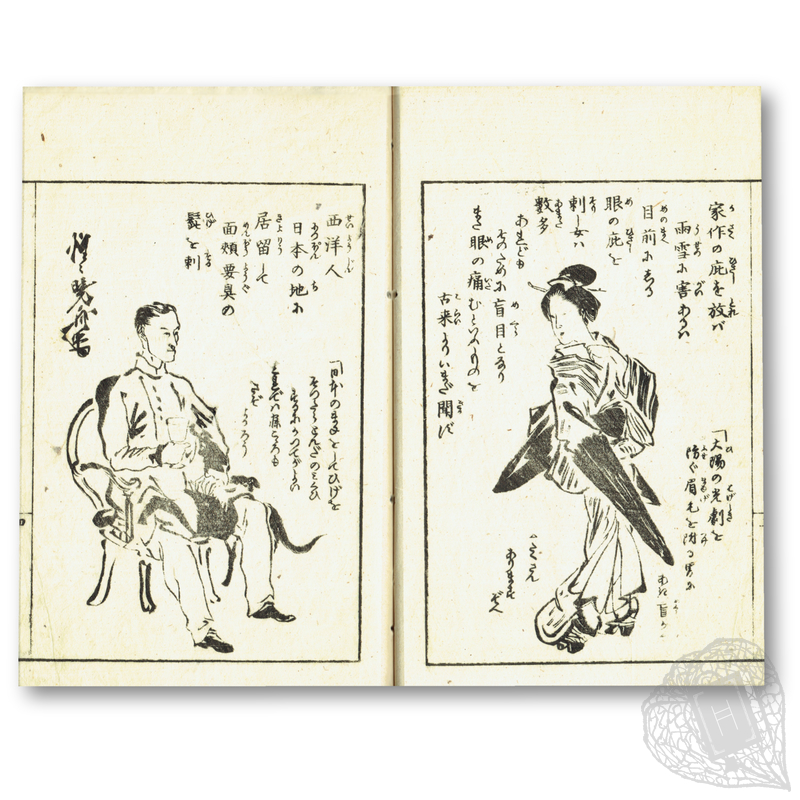Classic Illustrated Books Modern Art and Design Books Translations of Western Texts Japanese Literature Prints and Ephemera Western Books Photo Books Paintings & Scrolls Australia & New Zealand Others
Australia New Zealand Antarctica Japan Korea China Other
Edo Period [1603-1853] Bakumatsu Period [1853-1868] Meiji Period [1868-1912] Taishō Period [1912-1926] Shōwa Period [1926-1989]
Share this book on...

Tōsei Rikō Musume (A Clever Woman of the Present Day)
 ENQUIRE ENQUIRE |
Tōsei Rikō Musume ["A Clever Woman of the Present Day"]
Mantei Hattori, Kōsaburō [Ōga] [text by]; Seisei [Kawanabe], Kyōsai [illustrated by].
Tōkyō: Yamaguchiya Tōbē, [Meiji 6 (1873)].
A response to Fukuzawa Yukichi's Katawa Musume (1872), Tōsei Rikō Musume is one of the earliest works Mantei Ōga and Kawanabe Kyōsai produced together in this ephemeral zasshi format. Peter Kornicki (1978) provides a helpful overview of the publication in The Novels of Ozaki Kōyō: A Study of Selected Works with Special Reference to the Relationship between the Fiction of the Tokugawa and early Meiji periods:
"In this work [Ōga] sought to refute the arguments with which Fukuzawa Yukichi had attacked the customs of eyebrow-shaving and teeth-blacking in his Katawa Musume of September 1872. Tōsei riko musume is narrated in the first person by a woman who argues that the "katawamono" (maimed) are not those who shave their eyebrows and blacken their teeth but those who are such "prisoners of the West" that they reject the customs of their own country for those of foreign countries. She suggests that the customs of Japan are no more wrong than the western practice of having ears pierced for ear-rings, and points out, with a degree of logic on her side, that at least the Japanese practices are reversible."
Tōsei Rikō Musume was not Ōga's first work critical of Fukuzawa's teachings, being preceded by his 1872-1873 novel Ōdontaku Shinbun Kidan. His most successful riposte, however, was Katsuron Gakumon Suzume (1875), a satire based on Fukuzawa's Gakumon no Susume (1872). No physical copies traced outside of Japan in OCLC.
One karitoji-bound volume, complete, on double leaves, traditional East Asian binding style (fukurotoji). Original wrappers with a few small marks and creases. Ex-ownership seal to upper wrapper and last text page. Publisher's stamp and two holes to lower wrapper. Previous binding holes present. 6 leaves. 22.8 x 15.5 cm.
❧ Kornicki, Peter. "The Novels of Ozaki Kōyō: A Study of Selected Works with Special Reference to the Relationship between the Fiction of the Tokugawa and early Meiji periods". PhD thesis. St Antony's College, 1978.
# 240204-10


• Ask a question about this item >
Classic Illustrated Books Modern Art and Design Books Translations of Western Texts Japanese Literature Prints and Ephemera Western Books Photo Books Paintings & Scrolls Australia & New Zealand Others
Australia New Zealand Antarctica Japan Korea China Other
Edo Period [1603-1853] Bakumatsu Period [1853-1868] Meiji Period [1868-1912] Taishō Period [1912-1926] Shōwa Period [1926-1989]
Share this book on...












